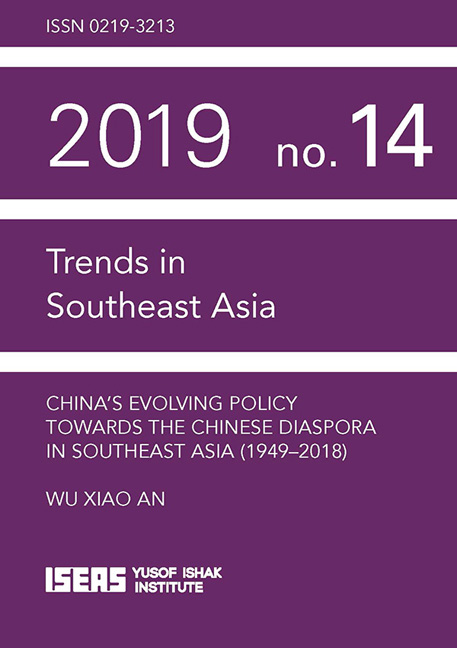China's Evolving Policy towards the Chinese Diaspora in Southeast Asia (1949–2018)
Published online by Cambridge University Press: 31 January 2020
Summary
EXECUTIVE SUMMARY
• The Chinese diaspora, consisting of both Chinese living overseas who are citizens of China (huaqiao), and people of Chinese descent who are citizens of foreign countries (huaren), have significantly shaped the making of modern China.
• China's policy towards its diaspora is primarily governed by its national interests and foreign policy imperatives. However, the Chinese government has been careful to ensure that the huaqiao and the huaren fall into different policy domains: Chinese citizens living overseas are subject to China's domestic policies, while Chinese descendants who are citizens of other countries come under China's foreign affairs. Nevertheless, from the beginning, the latter continue to be regarded as kinsfolk distinct from other foreign nationals.
• The huaqiao-huaren distinction is often blurred in ordinary discourse and this has been a source of much misunderstanding. However, it has not been the policy of the Chinese government to blur this distinction, and it is acutely aware of the complexity of the issue and is therefore very cautious about implying any change. As such, when terms such as huaqiao-huaren are introduced in the official lexicon, they are meant to acknowledge certain historical and contemporary realities, and not to deliberately obfuscate the two categories. The use of the combined term is in fact a recognition of the clear-cut distinction between the two groups, and is meant to convey a semantic balance in which neither category is emphasized at the expense of the other.
• In general, since the establishment of the People's Republic of China in 1949, the Chinese government has treated the diaspora as an asset, rather than a liability. The sole exception was during the Cultural Revolution when returnees, or the guiqiao, were condemned as reactionary and bourgeois elements.
• There is therefore a fundamental continuity in China's diaspora policy: namely, that China embraces both groups as part of a global Chinese community. Some policy shifts can be expected in future as China becomes more proactive in reaching out to its diaspora while balancing the needs and interests of Chinese abroad with the needs and interests of the Mainland.
- Type
- Chapter
- Information
- Publisher: ISEAS–Yusof Ishak InstitutePrint publication year: 2019



